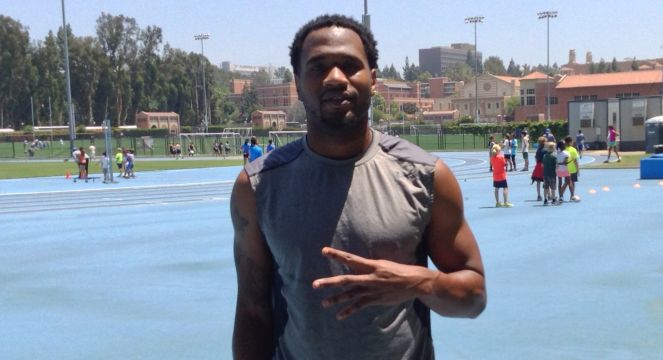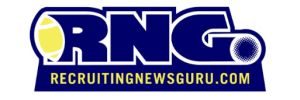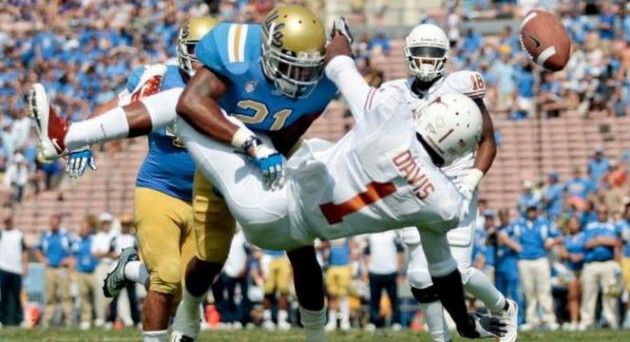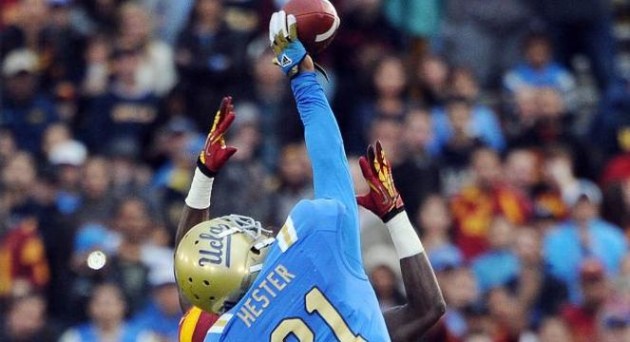Interview: Kansas City Chiefs CB Aaron Hester talks UCLA football and prep recruitment

Written by Ryan Wright
Success on the gridiron has not spoiled Kansas City Chiefs cornerback Aaron Hester yet, and after speaking with him one can guess that his open approach to life will stay true as he continues his journey on and off the football field.
After being around Aaron for just a few minutes words such as blessed, grateful, and hard work flow in an insightful and deliberate manner. In a chance street encounter, if that is not the case for you that will be the impression he leaves with those in his path. Hester’s humble nature and easy going mentality instantly puts those around him at ease. Self confidence exudes, but not anywhere close to being off putting which is a little confusing considering the Southern California native’s background.
Aaron Hester was a 4-star recruit out of Dominguez High School in Compton. Called up to the varsity ranks during a playoff run in his freshman season, the now 6’2”, 200 pound, athlete has seemingly always been in the spotlight gaining positive attention for his on the field play.
When Hester’s prep career was finished he was a three-year starter who shinned at both wide receiver and cornerback becoming a two-way starter by the end of his junior season. By the end of his senior season, he was pushing double-digit offers from some of the top programs in that nation. Schools like Arizona State, Oregon, Miami, Washington, Oregon State, Ole Miss, and Michigan wanted his skill set in their secondary.
UCLA was able to lure the immensely talented corner to Westwood which turned into a perfect fit for both parties. In a similar fashion to his high school career, he proved to be a mainstay on the field for the Bruins as a 4-year starter at UCLA, and still everything from Aaron is about hard work and being humble.
Aaron’s work ethic, understanding of the game, and physical abilities have kept him on the football field after his UCLA playing days. Since leaving the collegiate game with 131 career tackles along with five career interceptions, Hester has fought to prove himself in the league donning uniforms for the Denver Broncos, San Diego Chargers, Detroit Lions, and now with the Kansas City Chiefs.
Hester’s professional career is really just beginning, but he has a wealth of insight and wisdom to pass down to the younger players coming up through the ranks as a former high school 4-star athlete who played for one of the most iconic college football programs in the nation. In a Recruiting News Guru exclusive interview, I sat down with Aaron to get his insight on making the transition from the high school ranks to college, his mental and physical approach to the game, and how he handled his recruiting process as a member of the 2008 recruiting class.
Aaron, when did you start on the varsity level in high school?
“My sophomore year I started but I was actually moved up my freshman year for the playoffs.”
And that was at cornerback right?
“No, no, I was playing wide receiver.”
What year did you start playing cornerback for Dominguez?
“I started playing corner during the playoffs in my junior year of high school.”
I take it there was an injury and you had to be moved to corner?
“Yeah, there was an injury and they put me in there and I’ve been playing corner every since.”
Your senior year you were a two-way star for Dominguez playing both wide receiver and corner?
“Yes, definitely. I played wide receiver, corner, and I even did a little bit of returns. I was pretty much doing everything my senior year. Anything to help us win.”
I know it was a while back, but do you remember what your stats were your senior year?
“I know I had about six touchdowns on offense, and probably 3-4 interceptions on defense. I can’t remember my yards and catches. I was roughly somewhere around that.”
When the different colleges started recruiting you as a cornerback after spending several years playing wide receiver was that tough for you to change your mindset from one position to another?
“It was kind of natural change for me. Once I got offered as a corner I was like I want to play corner. All the attention I started getting was for being a cornerback it just kind of happened naturally. I was just trying to get a college scholarship no matter what position. When it came to corner I was ready to roll with it.”
I have the teams that offered you a scholarship as Arizona State, Miami, Oregon, Oregon State, San Diego State, and Washington. Where there any other teams that had extended offers to you?
“I know Ole Miss offered me. I know Michigan offered me and that’s pretty much all I can remember. That might be it.”
How many official visits did you take during your senior year?
“I took three. I went to UCLA, ASU, and Miami.”
Back then, not as you would look upon it now, but at the time of your recruitment what were the criteria for you when breaking down the different programs that had offered you on a pro-con list?
“I broke it down with a pro-con list for football and a pro-con list just for life. As far as football was concerned I wanted to have a consistent coach and playing time. As far as life, I wanted to go somewhere I could live for the next four years.
“A lot of guys just go to a school and only look at as far as football. Once football is over you have to live the rest of the year in that state or in that city. I had to make sure I went somewhere where I could see myself living and have a great alumni network. Just somewhere where I could see myself flourishing into a man outside of sports.”
That sounds like a great approach to breaking down offers. Looking back now, would you do anything differently from an evaluation standpoint not necessarily changing going to UCLA?
“I feel like if people have the opportunity and they have at least five offers they should take all five visits. I think that is an experience everybody should have because it might be that fourth or fifth school that will steal your heart. I advise people to go ahead and take all five visits if they have the opportunity.”
How did UCLA pitch you on signing your letter of intent with them and how was that influential to you?
“Well, I grew up a SC (University of Southern California) fan, I hate to say it. UCLA offered me right after my junior season was over. They were one of the first to notice my talents. I kind of felt a connection with them because they were the first to give me an opportunity to change the dynamic in my life and my families’ life. I felt connected to them the whole time.
“If you look where UCLA is, it is right across from Bel Air, Beverly Hills is right down the street, and it’s all Bruins living there that are in high places that I can network with. With football I knew I could play and I could play with whatever school I wanted to but football is not life. UCLA is where I could see my life turning into. I could see myself being a man in that area.”
Do you remember your height and weight your freshman season at UCLA?
“My freshman year I was probably about 6’1”, 190.”
I did some research and found that you were running a 4.4 forty-yard dash at that time, is that accurate?
“Yeah, I was in track shape. I was running track and came in fresh off the track. That’s why I lost all that weight (recently) to get the speed back (from 207 pounds to 200).”
For the upcoming NFL season?
“Yeah man, I had to.”
Dominguez is not necessarily that far from UCLA, but given that you were a freshman and now living away from home, what were some of the off-the-field transitions that were tough for you?
“You have to know that when you are away from home no one is watching you. You have to be responsible. It’s now a responsibility thing. I had to use the influence that I had in a positive way. I had to set an example for the younger guys coming up. I had to keep my nose clean, stay out of trouble, and pass all of my classes. On top of that you have football.
“This is the responsibility that you occupy now. You’re parents can’t tell you what to do and now it’s up to you. You’ve been in training camp for 18 years and when you get there, now it’s time to show what you’ve got.”
How was the transition on the field at UCLA for you during your freshman season? Was there an eye opening moment for you that made you realize just what a big difference the game is from high school to college?
“Yeah, going from being the top guy to being a bottom guy, you have to work your way back up. It was just another challenge. As far as the physical attributes, I don’t think I was behind on that point because I worked hard in high school. The harder you work the easier the transition will be going into college. Once you get into college you’re going to get even bigger. There’s no rush. Let nature take its course and let the body flourish as it will. How you look when you are 18 and how you look when you are 22 will be totally different. They shouldn’t panic if they are undersized right now.”
You just said it was a challenge going from being the top guy in high school to working your way back up to the top. Your freshman year you redshirted, how was that year for you being a scout team or look team guy?
“It was hard. I thought I should be playing. The coaches were seeing something else. They wanted me to mature mentally. They did not feel like they needed me at that point. I got over it and took it for what it was worth.
“You have to ball out when you redshirt like that because they’re looking at that depth-chart for the upcoming season. I redshirted and I was balling out on scout team. When that next spring ball came around I was a starter. That’s how fast it can change. If you max out your redshirt year and show them that you want to get better and that you are getting better you’ll be at the top come the next year for sure.”
You started your freshman year and started straight through your senior season?
“Yeah, I started four straight season openers. I made history my senior year. They told me I was the first to do that since – I forgot his name. It might have been Spencer Havner (and Mike McCloskey both during the 2002-2005 seasons).”
Did the moment ever hit you realizing I am the starting cornerback for UCLA?
“Yeah man, it was crazy. It was everything that I had worked for. It took some time for me to get there but I learned on my way there and it had me prepared. I tried not to let the moment get too big. You have to stay patient and stay humble because when you go out there, when you are a freshman and you’re starting as a freshman, you try to make a play so bad you’ll mess up. You have to relax and let the game come to you and prove that you are worthy of the occupation that you hold.”
Was there a moment looking back where the light bulb went off and the growing knowledge of the game started to come together with your physical abilities?
“Yeah, I think from the ‘09 season to the 2010 season, which was my redshirt freshman year to my redshirt sophomore year, is where I made my biggest leap. I came out and lead the team in interceptions in 2010. I think I was third or fourth in tackles.
“I made a name for myself in-conference. I picked off some good quarterbacks. I picked off Nick Foles (Arizona State), I picked off Matt Barkley (USC), and I picked off Jake Locker (Washington) and those guys are NFL quarterbacks now. I was making big plays and making a name for myself. I feel like that is when everything came together.”
Outside of the team drills and weight training what are or what were some of the things you did on your own in an effort to enhance your on the field abilities? What were some of the things you did to better prepare yourself for a given season?
“I would say footwork, the faster your feet the better off you’ll be on the football field. A lot of jump rope, a lot of ladder drills, and a lot of beach workouts doing workouts on the beach to get that resistance from the sand.
“The feet are the main thing in football. The faster the feet the better position you’ll be in to make plays. I would encourage kids to do a lot of jump rope and get those fast twitch fibers going. It’s not about how big you are anymore. That’s not the game that we play anymore. It’s about how fast you are. For receivers it’s how fast can you get open? It’s all about speed and quickness now.”
When you were at UCLA did you have any teams that you looked forward to playing year after year?
“I always wanted to play against SC, that’s a given. My big thing was playing against good quarterbacks. Playing against Stanford, USC, and Arizona, all of those teams had good quarterbacks when I was there, those types of games. And of course anytime we were on national television. That will always get you pumped up and gives you extra motivation. I used to create a challenge in my head every week. I pretty much prepared the same for every game so for me it was always a big game.”
Was there any wide receivers that you went up against in-conference that you enjoyed facing while at UCLA?
“Markus Wheaton at Oregon State and Robert Woods at USC was always a good challenge. Juron Criner from Arizona was always a good challenge. That’s pretty much it. Everybody else I felt like I could handle everybody else. Those three guys I had to bring my “A” game.”
When you got into your senior year and started looking towards the NFL, how was that process for you? What was that process like for you?
“You have to ask yourself is that what you really want to do. Some people think they should just try out for the NFL because it is the next level of football. You have to really love it. It comes with ups and downs. You have to make sure you really love it. If you are blessed with the opportunity I feel like everyone should take the opportunity even if you don’t make it. They should train as hard as they can and give it a shot because you never know. But you can’t focus on that too much in season you just have to keep that in the back of your head.
“Once you’re out you do little by little. You look for an agent and then a couple of weeks later you might look for a place to train. You don’t want to do it all at once. You have to do a little bit at a time to have it all set up for you once the season is over if that is really your dream.”
This maybe somewhat redundant but what do you do now differently as a professional football player that was different from what you did as a collegiate player from a training standpoint?
“My diet is way better. You have to eat better because in the NFL every slight advantage is a big advantage. A small win is a big win. What edge can I get on my competition? I sleep and I eat better. Now you are taking everything to a different level. Your focus is really on your body now. In college your focus is on girls, school, but now your body needs a livelihood. You take as much care as you can with your body and you are more precious with it.”
You’ve been at the highest levels of the game throughout your playing career. Through it all which coach has had the most influence on your career?
“Coach (Jim) Mora (UCLA head coach), if it wasn’t for him I don’t think I’d be here with the opportunities and connections that I have now. I think he is the most influential person for me as far as football is concerned.”
You have a platform right now to reach out to the younger players coming up through the ranks in football and in college, what wisdom or words of advice that you have not already laid out would you like to share with everyone?
“I want to tell them to work on awareness as far as paying attention to what is going on around them. Once they get to college they are superstars and a lot of distractions come with that. Not all attention is good attention. I want to raise awareness for them to look and really study the people that are around them. They need to weed out people they think are not really for them or are fake. A lot of people will try to bring you down once they see you on an upward projection.
“I’d tell them to stay focused and if football is their dream never waiver from it because you never know what is at the end of the road. If they come up on a couple of roadblocks like maybe they might get hurt, or might get cut a few times when they get to the NFL, but tell them to keep going and know that everything will be alright in the end.”
Photo credit: bleacherreport.com; No. 21 Aaron Hester defends a pass against USC.
Photo credit: lubbockonline.com; No. 21 Aaron Hester defends a pass against Texas.
Photo credit: recruitingnewsguru.com; Aaron Hester at UCLA.


